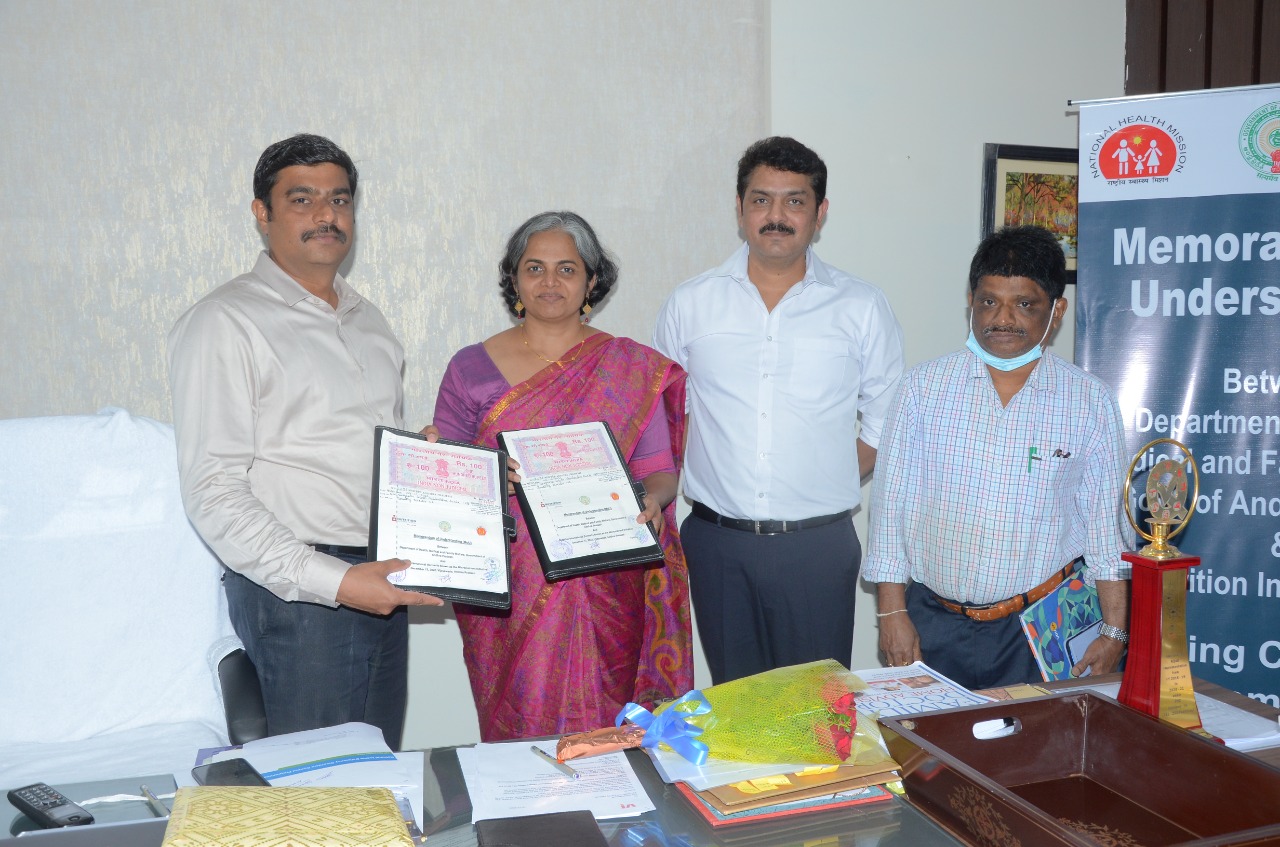News
Nutrition International and partners leverage food fortification to fight micronutrient deficiencies in the Philippines
February 5, 2024
Government of Andhra Pradesh and Nutrition International join hands to steer universal salt iodization in state
A memorandum of understanding between the Government of Andhra Pradesh and Nutrition International strengthens collaborative efforts toward a shared goal of improving the implementation of the National Iodine Disorders Control Program for achieving universal salt iodization in the state.
Posted on December 15, 2022
VIJAYAWADA, India: The Department of Health, Medical and Family Welfare, Government of Andhra Pradesh (AP) and Nutrition International on December 13th, 2022, signed a non-financial memorandum of understanding (MoU) to improve the implementation of the National Iodine Deficiency Disorders Control Program (NIDDCP) for achieving universal salt iodization (USI) in the state.

The Andhra Pradesh State Iodine Deficiency Disorder Survey 2020-21, conducted by the Department of Health, Medical and Family Welfare with technical support from Nutrition International, recorded 71.9% household coverage of adequately iodized salt in the state and total goiter rate of 1.8% amongst school-aged children.
Committed to improving coverage and ensuring universal salt iodization in the state, the Government of Andhra Pradesh has been implementing the NIDDCP program since 1986. The program was initially implemented in six goiter endemic districts and later scaled across the state. In recent years, the state government has also introduced initiatives such as salt testing by frontline health workers during Village Health, Sanitation and Nutrition Days and counselling beneficiaries on the benefits of iodized salt during gram sabha, or local governance meetings. The MoU is an effort to continue strengthening the program, with technical support from Nutrition International, to increase coverage of adequately iodized salt for optimal iodine nutrition of the population with a focus on pregnant women and lactating mothers.
“Through this partnership with Nutrition International, we are confident about ensuring adequate iodine nutrition for every individual across our state.
— J. Nivas, Managing Director, National Health Mission, Government of Andhra Pradesh
“This MoU reflects the state’s continued commitment to eradicating iodine deficiency and achieving USI, said J. Nivas, Managing Director, National Health Mission, Government of AP, highlighting the state government’s commitment to promoting iodine sufficiency for its population. “Through this partnership with Nutrition International, we are confident about ensuring adequate iodine nutrition for every individual across our state.”
The two organizations will work together to implement the national program by:
“At Nutrition International, as we celebrate our 30th anniversary this year, we look back at the work done with the Government of India, state governments as well as the salt industry to improve USI in the country,” said Mini Varghese, Country Director for India, Nutrition International, elaborating on the central approach to improving the availability of iodized salt in AP. “It is critical to consolidate the gains and improve the achievement of universal salt iodization through contextual and targeted interventions at the state and district level. Nutrition International will extend its complete support and expertise to the Government of AP to strengthen existing system to facilitate production, distribution and consumption of adequately iodized salt”.
Iodine is an essential micronutrient required for normal human growth and development. Iodine deficiency disorders (IDD), due to their effect on the developing brain, can cause irreversible physical and mental damage including cretinism, abortions, stillbirth, speech and hearing impairments, and goiter. On the other hand, IDDs are among the easiest and least expensive of all nutrient disorders to prevent with the addition of a small, constant amount of iodine to the salt that people consume daily. To this end, it is not only important to guarantee adequate production and consumption of iodized salt but also ensure that periodic surveys are conducted to assess the population’s iodine status. With the MoU in effect until 2025, both organizations will continue to steer sustained and focused interventions to achieve USI in AP.